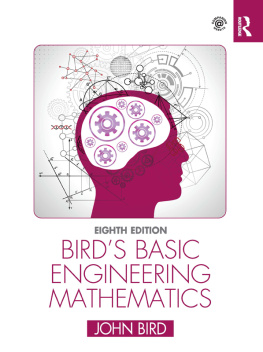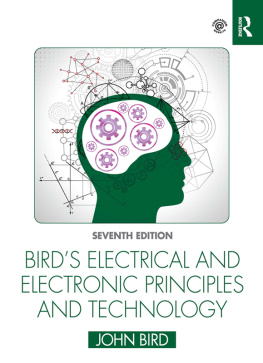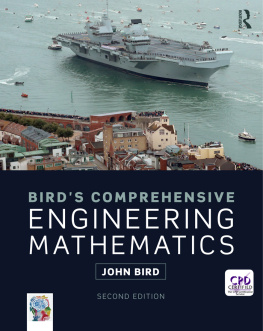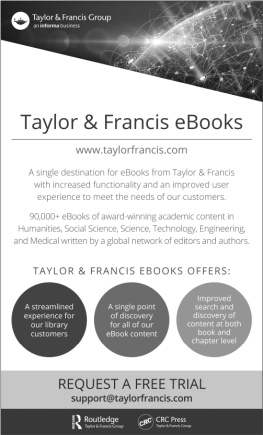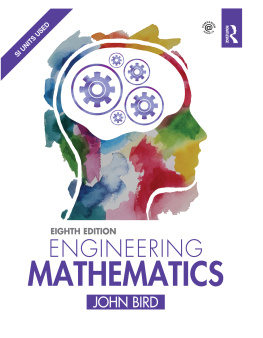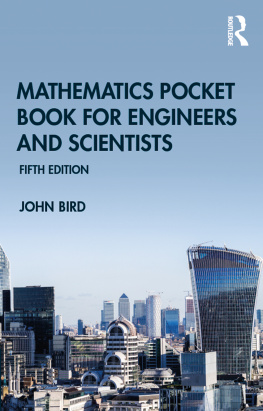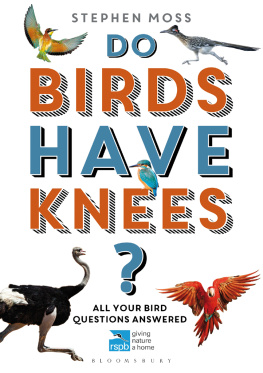Bird John - Birds Basic Engineering Mathematics
Here you can read online Bird John - Birds Basic Engineering Mathematics full text of the book (entire story) in english for free. Download pdf and epub, get meaning, cover and reviews about this ebook. year: 2020, publisher: CRC Press LLC, genre: Children. Description of the work, (preface) as well as reviews are available. Best literature library LitArk.com created for fans of good reading and offers a wide selection of genres:
Romance novel
Science fiction
Adventure
Detective
Science
History
Home and family
Prose
Art
Politics
Computer
Non-fiction
Religion
Business
Children
Humor
Choose a favorite category and find really read worthwhile books. Enjoy immersion in the world of imagination, feel the emotions of the characters or learn something new for yourself, make an fascinating discovery.
Birds Basic Engineering Mathematics: summary, description and annotation
We offer to read an annotation, description, summary or preface (depends on what the author of the book "Birds Basic Engineering Mathematics" wrote himself). If you haven't found the necessary information about the book — write in the comments, we will try to find it.
Birds Basic Engineering Mathematics — read online for free the complete book (whole text) full work
Below is the text of the book, divided by pages. System saving the place of the last page read, allows you to conveniently read the book "Birds Basic Engineering Mathematics" online for free, without having to search again every time where you left off. Put a bookmark, and you can go to the page where you finished reading at any time.
Font size:
Interval:
Bookmark:

Why is knowledge of mathematics important in engineering?
A career in any engineering or scientific field will require both basic and advanced mathematics. Without mathematics to determine principles, calculate dimensions and limits, explore variations, prove concepts, and so on, there would be no mobile telephones, televisions, stereo systems, video games, microwave ovens, computers or virtually anything electronic. There would be no bridges, tunnels, roads, skyscrapers, automobiles, ships, planes, rockets or most things mechanical. There would be no metals beyond the common ones, such as iron and copper, no plastics, no synthetics. In fact, society would most certainly be less advanced without the use of mathematics throughout the centuries and into the future.
Electrical engineers require mathematics to design, develop, test, or supervise the manufacturing and installation of electrical equipment, components or systems for commercial, industrial, military or scientific use.
Mechanical engineers require mathematics to perform engineering duties in planning and designing tools, engines, machines and other mechanically functioning equipment; they oversee installation, operation, maintenance and repair of such equipment as centralised heat, gas, water and steam systems.
Aerospace engineers require mathematics to perform a variety of engineering work in designing, constructing and testing aircraft, missiles, and spacecraft; they conduct basic and applied research to evaluate adaptability of materials and equipment to aircraft design and manufacture and recommend improvements in testing equipment and techniques.
Nuclear engineers require mathematics to conduct research on nuclear engineering problems or apply principles and theory of nuclear science to problems concerned with release, control and utilisation of nuclear energy and nuclear waste disposal.
Petroleum engineers require mathematics to devise methods to improve oil and gas well production and determine the need for new or modified tool designs; they oversee drilling and offer technical advice to achieve economical and satisfactory progress.
Industrial engineers require mathematics to design, develop, test and evaluate integrated systems for managing industrial production processes, including human work factors, quality control, inventory control, logistics and material flow, cost analysis and production coordination.
Environmental engineers require mathematics to design, plan, or perform engineering duties in the prevention, control and remediation of environmental health hazards, using various engineering disciplines; their work may include waste treatment, site remediation or pollution control technology.
Civil engineers require mathematics in all levels in civil engineering structural engineering, hydraulics and geotechnical engineering are all fields that employ mathematical tools such as differential equations, tensor analysis, field theory, numerical methods and operations research.
Knowledge of mathematics is therefore needed by each of the engineering disciplines listed above.
It is intended that this text Bird's Basic Engineering Mathematics will provide a step by step approach to learning all the early, fundamental mathematics needed for your future engineering studies
Now in its eighth edition, Bird's Basic Engineering Mathematics has helped thousands of students to succeed in their exams. Mathematical theories are explained in a straightforward manner, supported by practical engineering examples and applications to ensure that readers can relate theory to practice. Some 1,000 engineering situations/problems have been flagged-up to help demonstrate that engineering cannot be fully understood without a good knowledge of mathematics.
The extensive and thorough coverage makes this a great text for introductory level engineering courses such as for aeronautical, construction, electrical, electronic, mechanical, manufacturing engineering and vehicle technology including for BTEC First, National and Diploma syllabuses, City & Guilds Technician Certificate and Diploma syllabuses, and even for GCSE revision.
Its companion website provides extra materials for students and lecturers, including full solutions for all 1,700 further questions, lists of essential formulae, multiple choice tests, and illustrations, as well as full solutions to revision tests for course instructors.
John Bird, BSc (Hons), CEng, CMath, CSci, FIMA, FIET, FCollT, is the former Head of Applied Electronics in the Faculty of Technology at Highbury College, Portsmouth, UK. More recently, he has combined freelance lecturing at the University of Portsmouth, with Examiner responsibilities for Advanced Mathematics with City and Guilds and examining for the International Baccalaureate Organisation. He has over 45 years' experience of successfully teaching, lecturing, instructing, training, educating and planning trainee engineers study programmes. He is the author of 146 textbooks on engineering, science and mathematical subjects, with worldwide sales of over one million copies. He is a chartered engineer, a chartered mathematician, a chartered scientist and a Fellow of three professional institutions. He has recently retired from lecturing at the Defence College of Marine Engineering in the Defence College of Technical Training at H.M.S. Sultan, Gosport, Hampshire, UK, one of the largest engineering training establishments in Europe.
Eighth edition published 2021
by Routledge
2 Park Square, Milton Park, Abingdon, Oxon, OX14 4RN
and by Routledge
52 Vanderbilt Avenue, New York, NY 10017
Routledge is an imprint of the Taylor & Francis Group, an informa business
The right of John Bird to be identified as author of this work has been asserted by him in accordance with sections 77 and 78 of the Copyright, Designs and Patents Act 1988.
All rights reserved. No part of this book may be reprinted or reproduced or utilised in any form or by any electronic, mechanical, or other means, now known or hereafter invented, including photocopying and recording, or in any information storage or retrieval system, without permission in writing from the publishers.
Trademark notice: Product or corporate names may be trademarks or registered trademarks, and are used only for identification and explanation without intent to infringe.
First edition published by Newnes 1999
Seventh edition published by Routledge 2017
British Library Cataloguing-in-Publication Data
A catalogue record for this book is available from the British Library
Library of Congress Cataloging-in-Publication Data
A catalog record has been requested for this book
ISBN: 9780367643706 (hbk)
ISBN: 9780367643676 (pbk)
ISBN: 9781003124214 (ebk)
Typeset in Times by
Cenveo Publisher Services
Visit the companion website: www.routledge.com/cw/bird
The publisher wishes to thank CASIO Electronic Co. Ltd, London for permission to reproduce the image of the Casio fx-991ES calculator on page 27.
The publisher also wishes to thank the AA Media Ltd for permission to reproduce the map of Portsmouth on page 166.
To Sue
Birds Basic Engineering Mathematics 8th Edition introduces and then consolidates basic mathematical principles and promotes awareness of mathematical concepts for students needing a broad base for further vocational studies. In this eighth edition, examples and problems where
Font size:
Interval:
Bookmark:
Similar books «Birds Basic Engineering Mathematics»
Look at similar books to Birds Basic Engineering Mathematics. We have selected literature similar in name and meaning in the hope of providing readers with more options to find new, interesting, not yet read works.
Discussion, reviews of the book Birds Basic Engineering Mathematics and just readers' own opinions. Leave your comments, write what you think about the work, its meaning or the main characters. Specify what exactly you liked and what you didn't like, and why you think so.

